Table of Contents
AWS AI Practitioner Certification Overview: 2025
Traditional AI certifications often target data scientists and machine learning engineers. Amazon Web Services broke that mold.
Amazon Web Services launched something different in October 2024. The AWS Certified AI Practitioner (AIF-C01) targets business analysts, marketing professionals, and project managers (not just developers). While 73% of employers desperately need AI-skilled talent, three out of four can’t find qualified candidates. This foundational certification fills that gap.
The timing is perfect: AI has shifted from specialized tool to business necessity. The AIF-C01 validates foundational AI literacy across industries, creating a common language for AI discussions. Companies are offering salary premiums up to 47% for IT professionals with AI skills, 43% for sales and marketing roles, and 42% for finance positions.
The certification costs $100. Takes 90 minutes. Requires zero coding experience.
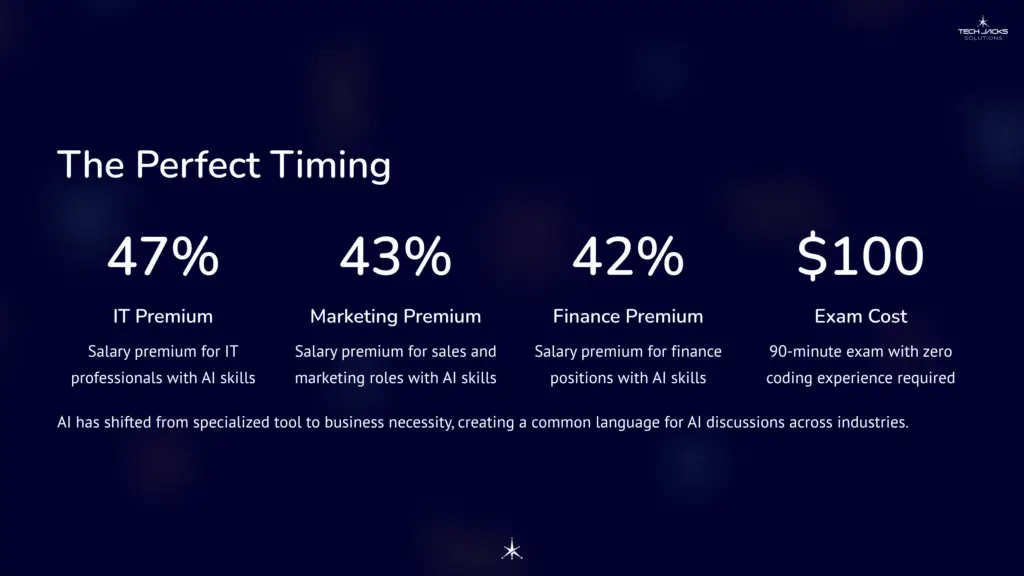
What’s the Deal with AWS Certified AI Practitioner?
The AIF-C01 represents AWS’s strategic entry into foundational AI credentialing. Launched in October 2024 after a beta testing phase, the certification targets individuals who “use but do not necessarily build AI/ML solutions on AWS”.
This isn’t your typical technical certification. AWS designed it for the broader professional community interacting with AI technology — business analysts, marketing specialists, project managers, and sales professionals. The official exam guide defines candidates as having up to six months of general exposure to AI and machine learning technologies on the AWS platform.
The certification carries significant industry weight due to AWS’s market position. As of early 2023, AWS commanded 33% of the global cloud market, followed by Microsoft Azure at 22% and Google Cloud at 9%. This dominance allows AWS to effectively set industry standards for AI knowledge.
Recent momentum is impressive. AWS introduced an “Early Adopter” digital badge for individuals who passed the exam by February 15, 2025. This marketing push generated critical mass among early certified professionals.
The curriculum emphasizes modern generative AI concepts and practical applications. Unlike traditional ML certifications focused on model development, the AIF-C01 concentrates on foundation models, prompt engineering, and responsible AI deployment. The exam heavily weights generative AI fundamentals (24%) and foundation model applications (28%).

Who Should Look Into This?
The AIF-C01 targets five primary professional groups. Each gains distinct value from the certification.
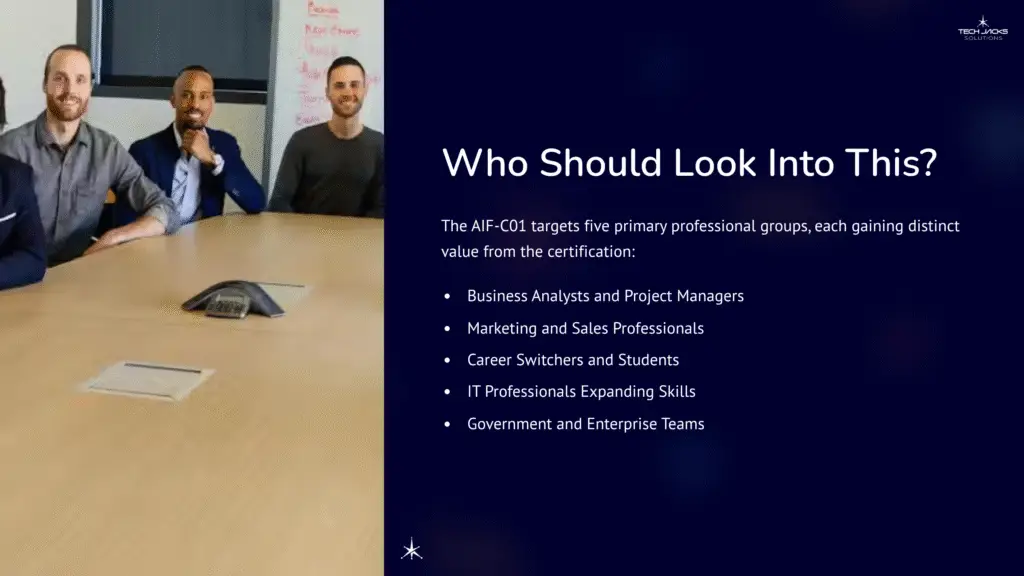
Business Analysts and Project Managers represent the core audience. These professionals coordinate AI initiatives without building the underlying technology. AWS explicitly targets business analysts, IT support specialists, marketing professionals, product and project managers, line-of-business managers, and sales professionals. The certification equips them with vocabulary to identify AI opportunities and collaborate effectively with technical teams.
Marketing and Sales Professionals benefit significantly from AI literacy. Modern marketing increasingly relies on AI for content generation, customer segmentation, and campaign optimization. Sales and marketing roles command up to 43% salary premiums for AI skills. The certification validates competency in generative AI applications like content creation and customer service automation.
Career Switchers and Students find exceptional value in the AIF-C01’s accessibility. No formal prerequisites exist, though AWS recommends familiarity with core services. The certification can serve as a starting point, though candidates with AWS Certified Cloud Practitioner knowledge gain distinct advantages. For $100, career changers access high-demand AI skills without extensive technical background.
IT Professionals Expanding Skills use the AIF-C01 as a foundation for specialized AI roles. The certification offers two recertification pathways: direct recertification via the latest AIF-C01 exam or upgrading through the AWS Certified Machine Learning Engineer – Associate exam. This creates a structured career progression funnel.
Government and Enterprise Teams benefit from organizational AI literacy. Organizations sponsoring AIF-C01 certification for teams create shared understanding for AI initiatives, leading to more efficient project scoping and faster troubleshooting. The standardized knowledge base accelerates AI adoption across departments.
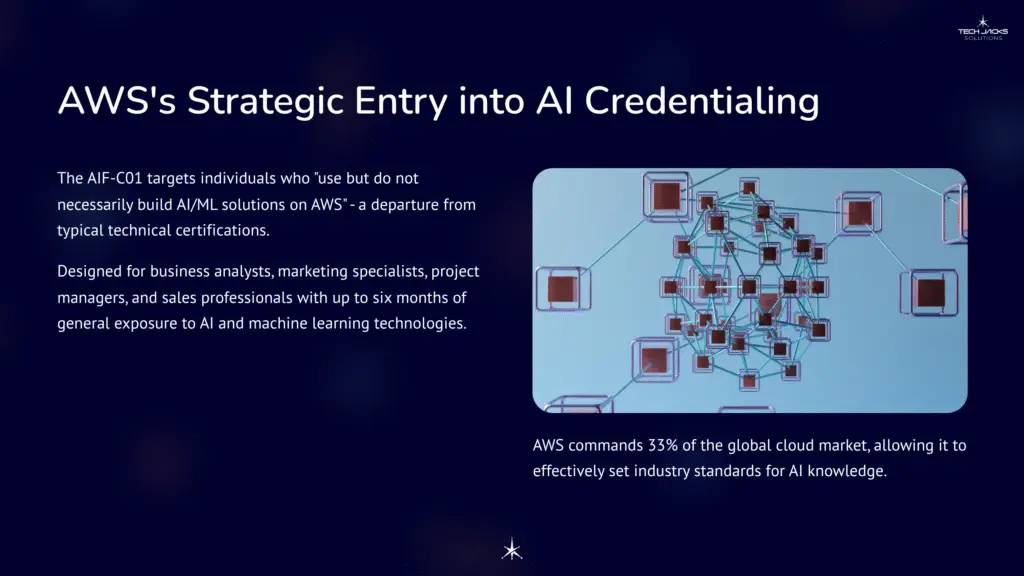
5 Core Domains: What You Need to Master
The AIF-C01 exam divides knowledge into five weighted domains. Each reflects AWS’s priorities for AI practitioners.
Domain 1: Fundamentals of AI and ML (20%) establishes conceptual foundations. This section covers AI, ML, deep learning, and neural network definitions, plus distinctions between supervised, unsupervised, and reinforcement learning. Candidates learn practical business applications like fraud detection and recommendation systems. Key AWS services include Amazon SageMaker, Amazon Transcribe, Amazon Translate, and Amazon Comprehend.
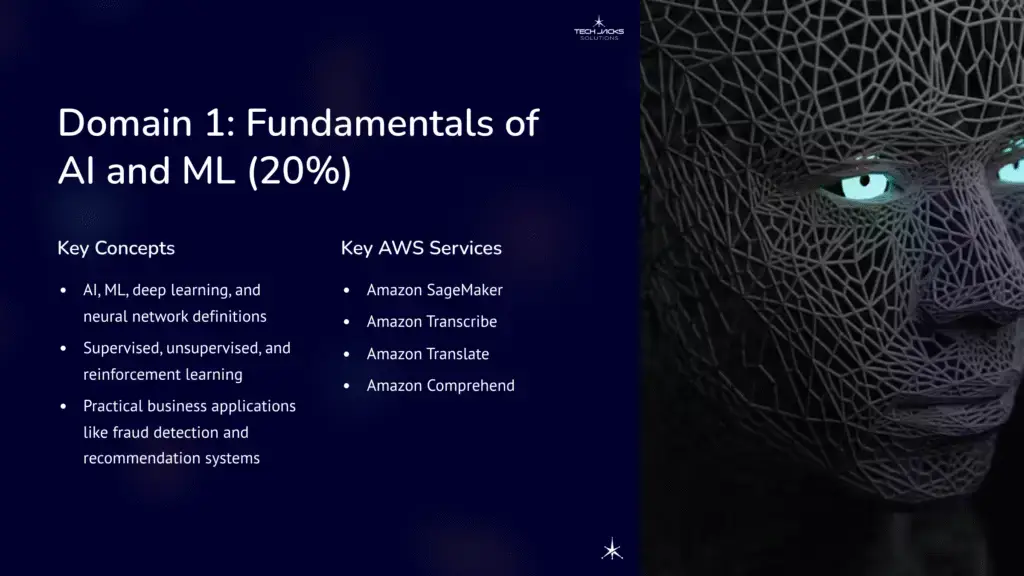
Domain 2: Fundamentals of Generative AI (24%) focuses on modern AI applications. Topics include tokens, embeddings, foundation models, transformer architecture, and diffusion models. The domain assesses understanding of generative AI use cases — text summarization, chatbot development, code generation — plus limitations like hallucinations and non-determinism. Primary AWS services include Amazon Bedrock, SageMaker JumpStart, PartyRock, and Amazon Q.
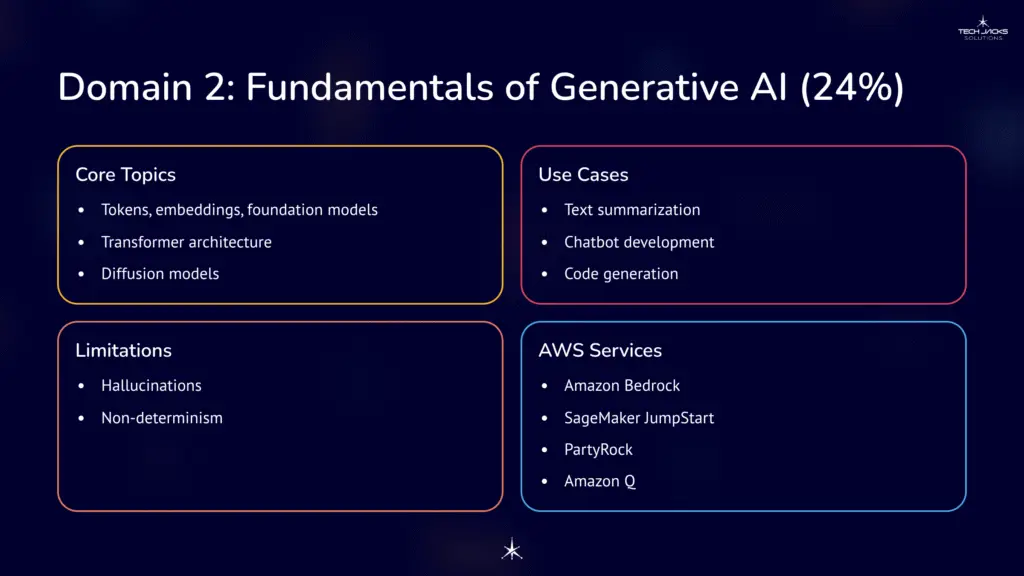
Domain 3: Applications of Foundation Models (28%) represents the exam’s technical peak. This heavily weighted section covers model selection criteria, inference parameters, prompt engineering techniques including zero-shot and few-shot prompting, plus Retrieval Augmented Generation (RAG). Advanced concepts include vector databases, fine-tuning, and AI agents for automating complex tasks. The domain centers on Amazon Bedrock’s advanced capabilities and AWS vector storage services.

Domain 4: Guidelines for Responsible AI (14%) addresses ethical imperatives. Core concepts include fairness, bias detection, transparency, explainability, and AI model safety. Candidates learn tools for detecting bias in datasets and models, plus legal and reputational risks from generative AI. AWS services include Guardrails for Amazon Bedrock, SageMaker Clarify, and Amazon Augmented AI.
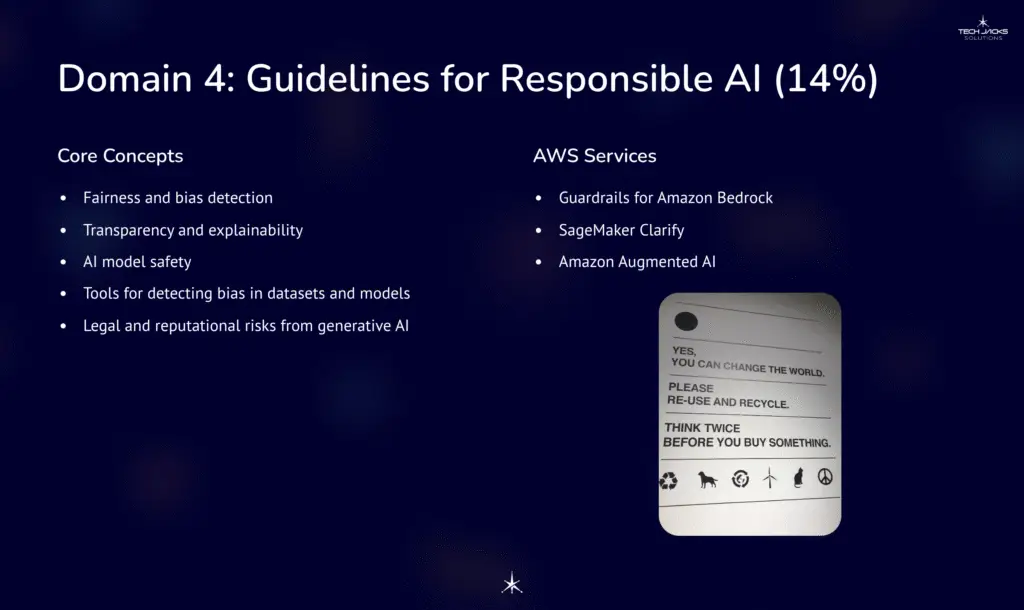
Domain 5: Security, Compliance, and Governance (14%) covers operational realities. This section addresses data lineage, encryption, access control within the AWS shared responsibility model, plus regulatory standards like ISO and SOC. Security threats specific to AI include prompt injection and model poisoning. Relevant services span AWS IAM, Amazon Macie, AWS Config, and CloudTrail.
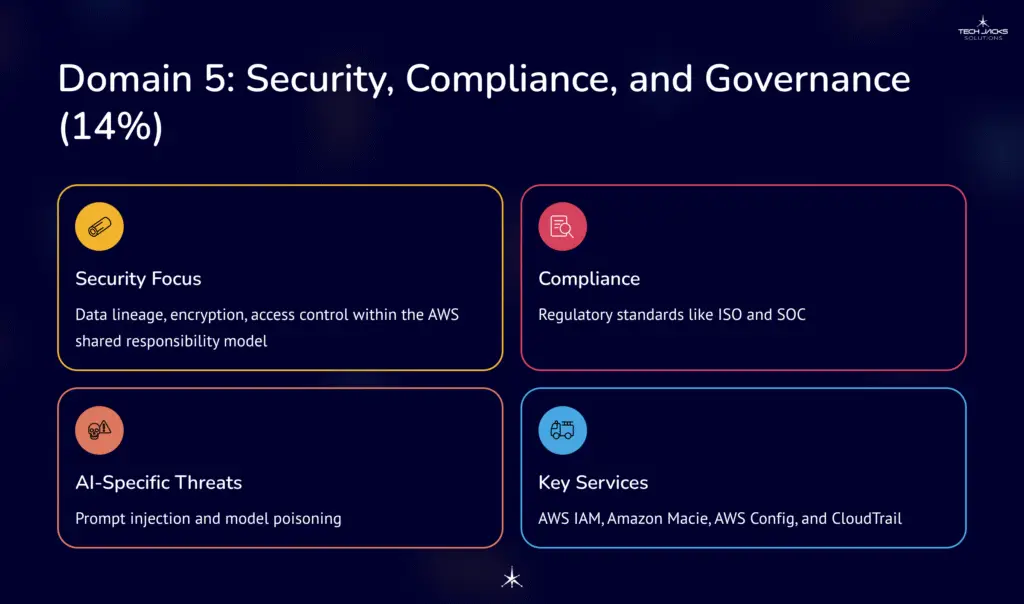
What to Expect From the Exam
The AIF-C01 exam mechanics reflect careful design for accessibility while maintaining credibility.
The exam contains 65 questions over 90 minutes, though only 50 questions count toward scoring. The remaining 15 unscored items gather performance data for future exam development. Candidates don’t know which questions are unscored.
Question formats include multiple choice (one correct answer), multiple response (two or more correct answers), ordering, and matching. This diversity assesses conceptual understanding and knowledge application rather than hands-on implementation skills.
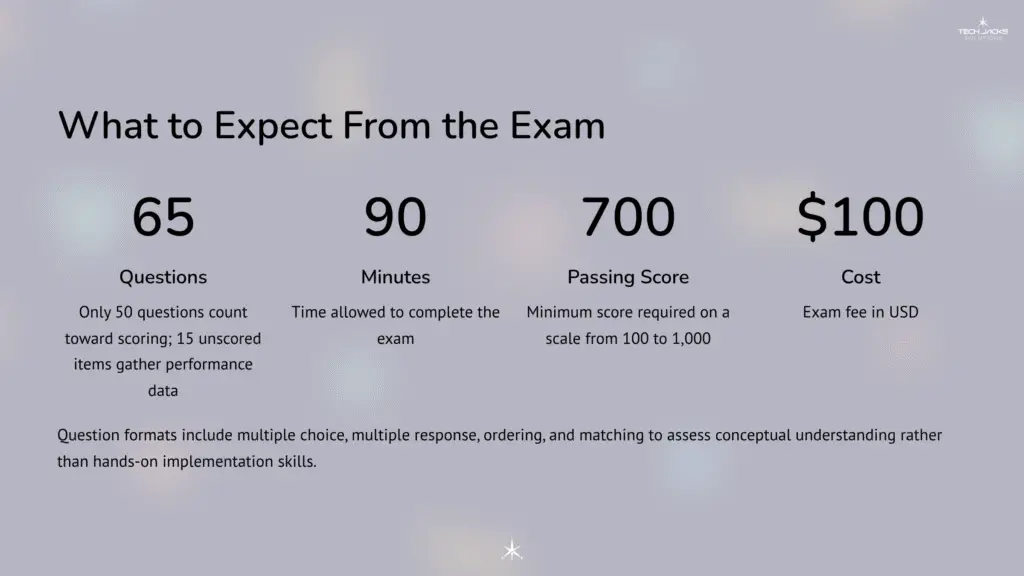
Scoring and Passing Requirements: Results use scaled scoring from 100 to 1,000, with 700 required to pass. The compensatory scoring model means strong performance in one domain can offset weaker performance in another, provided overall scores meet the 700-point threshold.
Cost Structure: The exam costs $100 USD, positioning it within AWS’s foundational tier. Failed candidates must wait 14 calendar days before retaking, with full exam fees required for each attempt. No official limit exists on retake attempts.
Testing Options: Pearson VUE administers the exam globally through physical testing centers or online proctored sessions. Language availability launched with English, Japanese, Korean, Portuguese (Brazil), and Simplified Chinese. Planned August 2025 expansion adds Arabic, French, German, Italian, Spanish, and Traditional Chinese.

Certification Benefits: Successful candidates receive digital badges and 50% discount vouchers for future AWS exams. The voucher applies to recertification or pursuing other AWS certifications, encouraging continued professional development.
Career Impact and Salary Expectations
Direct salary data for AIF-C01 holders doesn’t exist due to the certification’s recent launch. However, multiple data sources provide reliable projections.

Foundational Certification Baseline: The closest comparison comes from AWS Certified Cloud Practitioner holders. ZipRecruiter reports average annual salaries of $85,866 for entry-level positions, while Skillsoft’s 2024 IT Skills and Salary Report shows $142,704 average US salaries for Cloud Practitioner holders. These figures vary significantly based on experience, location, and survey methodology.
AI Skills Premium: The most compelling indicator comes from documented AI salary premiums. AWS’s November 2023 study revealed employers offer substantial increases for AI-skilled workers: up to 47% for IT professionals, 43% for sales and marketing roles, and 42% for finance positions. The Dice 2024 Tech Salary Report independently confirmed that technology professionals in AI development earn 17.7% more than non-AI peers.
Projected Impact: The AIF-C01’s value lies in augmenting existing roles rather than creating new job categories. For non-technical professionals, the certification serves as verifiable AI competency, potentially unlocking salary premiums in the 17% to 47% range. For entry-level IT professionals, the AIF-C01 can help command salaries at the higher end of the Cloud Practitioner spectrum (likely $100,000 to $120,000 in major technology hubs).
Job Market Positioning: Early job postings include the AIF-C01 in roles like “Senior AI Cloud Developer,” “Director of AI Programs and Automation,” and “IT Support Specialist”. Currently positioned as “nice-to-have” rather than mandatory, the certification functions as a positive signal demonstrating proactive engagement with AI trends.
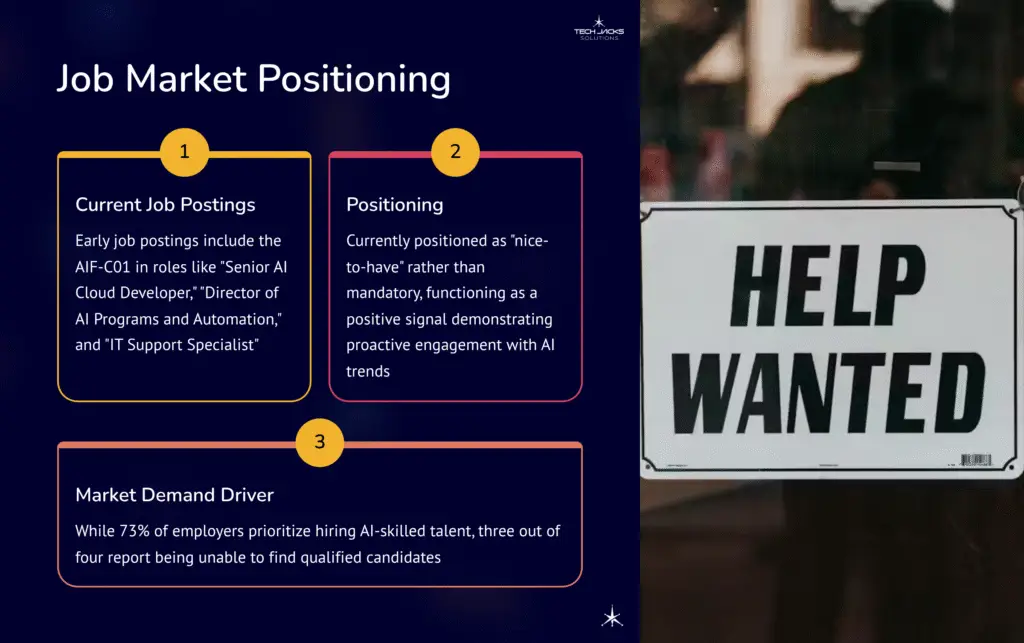
Market Demand Driver: The fundamental force behind value is acute talent shortage. While 73% of employers prioritize hiring AI-skilled talent, three out of four report being unable to find qualified candidates, this supply-demand imbalance means credible AI credentials carry significant weight in hiring decisions.
Prerequisites and Experience Requirements
The AIF-C01’s accessibility represents a strategic design choice to democratize AI literacy.
Official Requirements: No formal prerequisites exist for taking the exam. AWS defines the target candidate as someone with up to six months of general exposure to AI and machine learning technologies on the AWS platform. This low barrier encourages widespread adoption across diverse professional backgrounds.
Recommended Background: AWS recommends baseline familiarity with core services including Amazon EC2, Amazon S3, AWS Lambda, and Amazon SageMaker, plus understanding of the shared responsibility model, IAM, global infrastructure, and service pricing models. This knowledge provides context for AI services running on AWS infrastructure.
Optimal Preparation Path: Candidates with AWS Certified Cloud Practitioner certification or equivalent knowledge gain distinct advantages. The foundational cloud understanding accelerates comprehension of AI service architectures and use cases.
Timeline Expectations: Community feedback suggests focused study periods ranging from a few hours for experienced AWS professionals to a few weeks for newcomers. The conceptual rather than hands-on nature reduces preparation time compared to technical certifications.
Difficulty Assessment: The prevailing community sentiment describes the AIF-C01 as relatively straightforward, especially for individuals with AWS or general AI background. However, effective time management during the 90-minute period remains crucial for success.
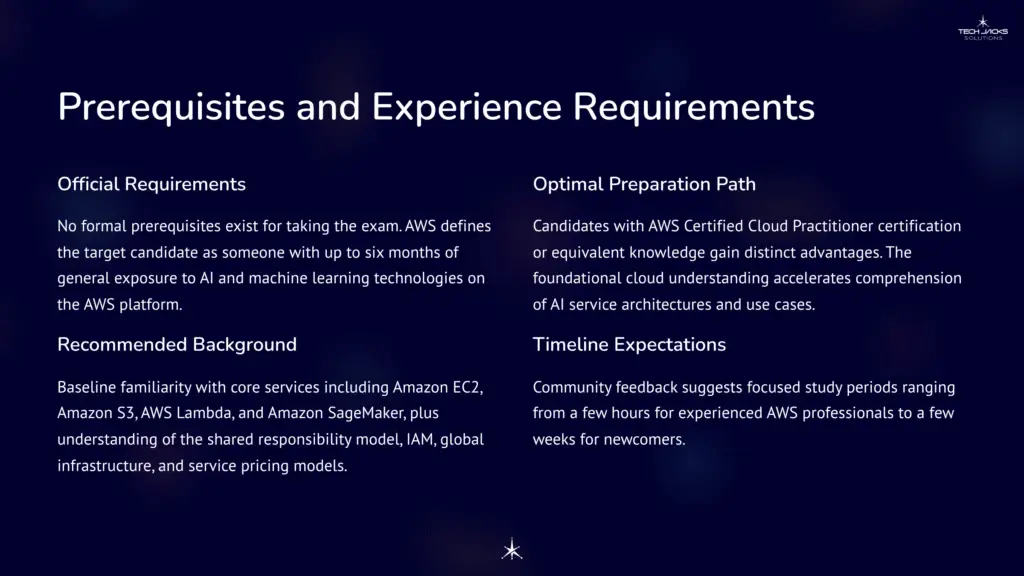
Preparation Strategy: How to Actually Pass
Successful AIF-C01 preparation requires structured approach combining official materials with quality third-party resources.

Official AWS Resources: AWS provides materials through Skill Builder, structured around a four-step “Exam Prep Plan”. Free resources include the official exam guide, practice question sets with 20 exam-style questions, and two-hour digital courses covering each domain. Subscription-based resources starting at $29 monthly unlock full-length practice exams, enhanced prep courses with 6-8 hours of content, and hands-on labs.
Third-Party Options: Video courses from Udemy instructors like Stephane Maarek and Frank Kane provide alternative teaching styles. TutorialsDojo has earned strong community reputation for meticulously crafted practice exams that closely mirror real exam difficulty and style, with exceptionally detailed answer explanations. Written guides include O’Reilly’s “AWS Certified AI Practitioner Study Guide” by Tom Taulli.
Community-Proven Strategies: The most frequently cited success factor is working through extensive high-quality practice questions, which builds familiarity with AWS’s specific question phrasing style. Additional recommendations include hands-on AWS console exploration with key AI services and standard test-taking techniques like flagging difficult questions for review.
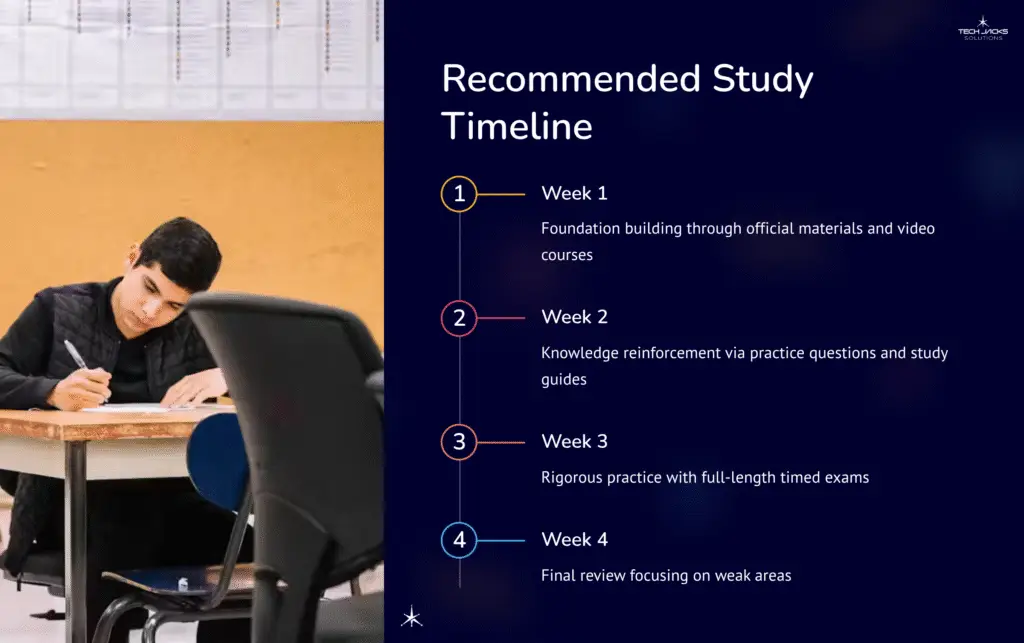
Study Timeline: A recommended four-week framework includes: Week 1 foundation building through official materials and video courses; Week 2 knowledge reinforcement via practice questions and study guides; Week 3 rigorous practice with full-length timed exams; and Week 4 final review focusing on weak areas. Add an addition 2 weeks if you want to review concepts more in-depth.
Resource Investment: Most candidates succeed with modest investment. The official exam guide costs nothing. Quality video courses range $50-100. Premium practice exam packages cost $30-50. AWS Skill Builder subscription adds $29 monthly for enhanced materials.

Recent Updates and What’s Changed
The AIF-C01 launched as AWS’s first foundational AI certification, reflecting current industry priorities.
Launch Timeline: Following mid-2024 announcement, AWS conducted beta testing before standard exam availability in October 2024. The certification represents AWS’s response to growing demand for AI literacy validation across non-technical roles.
Curriculum Focus: The exam curriculum aligns with 2024’s AI landscape, emphasizing generative AI and foundation models. Combined, generative AI fundamentals and foundation model applications comprise 52% of exam content. This weighting reflects the practical reality that most business AI applications now center on large language models and generative capabilities.
Service Integration: The curriculum integrates AWS’s latest AI services, particularly Amazon Bedrock for foundation model access and Amazon Q for AI-powered assistance. Advanced topics include Retrieval Augmented Generation (RAG) and AI agents, representing cutting-edge capabilities businesses are actually implementing.
Global Expansion: Scheduled August 2025 language expansion demonstrates AWS’s global ambitions, adding Arabic, French, German, Italian, Spanish, and Traditional Chinese to the initial English, Japanese, Korean, Portuguese, and Simplified Chinese offerings.
Early Adoption Incentives: The “Early Adopter” badge program through February 15, 2025, generated initial momentum and established market presence. This strategic timing allowed AWS to build critical mass before competitors responded.
How AI is Transforming Certification Careers
The AIF-C01 emerges at the intersection of AI democratization and workforce transformation.
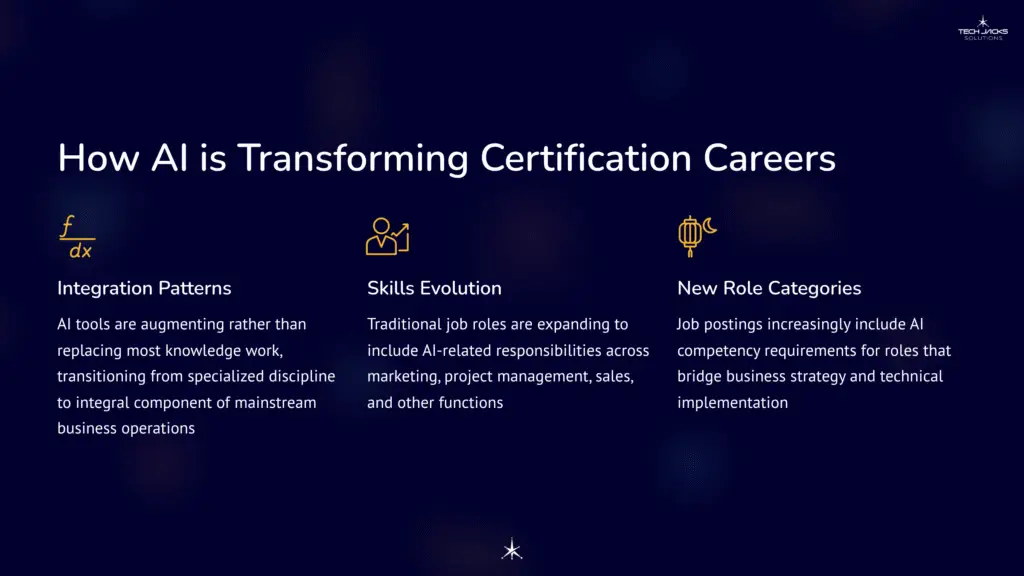
Current Integration Patterns: AI tools are augmenting rather than replacing most knowledge work. Artificial intelligence has transitioned from specialized discipline to integral component of mainstream business operations across virtually every industry. Professionals need AI literacy to collaborate effectively with automated systems and technical teams.
Skills Evolution: Traditional job roles are expanding to include AI-related responsibilities. Marketing teams use generative AI for content creation. Project managers coordinate AI implementations. Sales professionals use AI for customer insights. Foundational understanding of artificial intelligence is rapidly becoming core competency for all knowledge workers, analogous to office productivity software proficiency.
New Role Categories: Job postings increasingly include AI competency requirements for roles like “Director of AI Programs and Automation” and “Senior AI Cloud Developer”. These positions bridge business strategy and technical implementation, requiring the exact skills the AIF-C01 validates.
Competitive Advantage: The U.S. Bureau of Labor Statistics projects computer and information technology employment will grow much faster than average between 2023 and 2033, with AI as a key catalyst. Specific AI-related roles like “Computer and Information Research Scientists” show projected 26% employment growth (significantly higher than all-occupation averages).
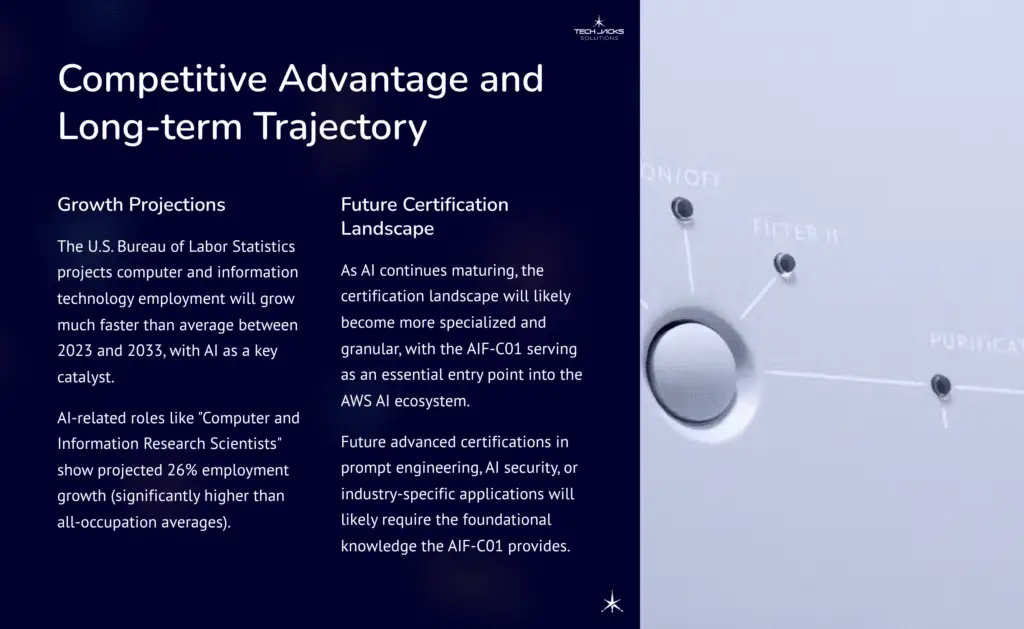
Long-term Trajectory: As AI continues maturing, certification landscape will likely become more specialized and granular, with the AIF-C01 serving as essential entry point into AWS AI ecosystem. Future advanced certifications in prompt engineering, AI security, or industry-specific applications will likely require foundational knowledge the AIF-C01 provides.
Is AWS Certified AI Practitioner Worth It in 2025?
Yes. Multiple data sources confirm the AIF-C01’s value proposition across several dimensions.
Economic Case: At $100, the certification offers exceptional return on investment. General AWS certification data shows 91% of learners report positive ROI from training investment, with 74% attributing higher earnings directly to credentials. Given the documented AI skills premium, the AIF-C01 provides one of the most cost-effective entry points into high-growth AI careers.
Market Timing: The certification launches at optimal timing. While employer demand for AI skills reaches 73%, supply remains severely constrained with three-quarters of employers unable to find qualified candidates. This supply-demand imbalance ensures credible AI credentials carry significant hiring weight.
Strategic Positioning: AWS’s 33% cloud market share gives the AIF-C01 broader industry recognition potential compared to competitors. The certification provides access to the most extensive AI service ecosystem, from foundation models through specialized industry applications.
Future-Proofing: The enduring value is directly proportional to AI’s continued strategic importance to businesses worldwide — a trend for which all available data indicates strong, sustained momentum. As long as organizations invest in AI for competitive advantage, foundational AI literacy credentials remain highly relevant.
Competitive Landscape: Microsoft’s Azure AI Fundamentals represents the closest competitor. ZipRecruiter data shows average salaries around $121,476 for Azure AI Fundamentals holders, suggesting strong market value for foundational AI skills regardless of platform. Google Cloud lacks direct foundational equivalent, leaving the field primarily to AWS and Microsoft.
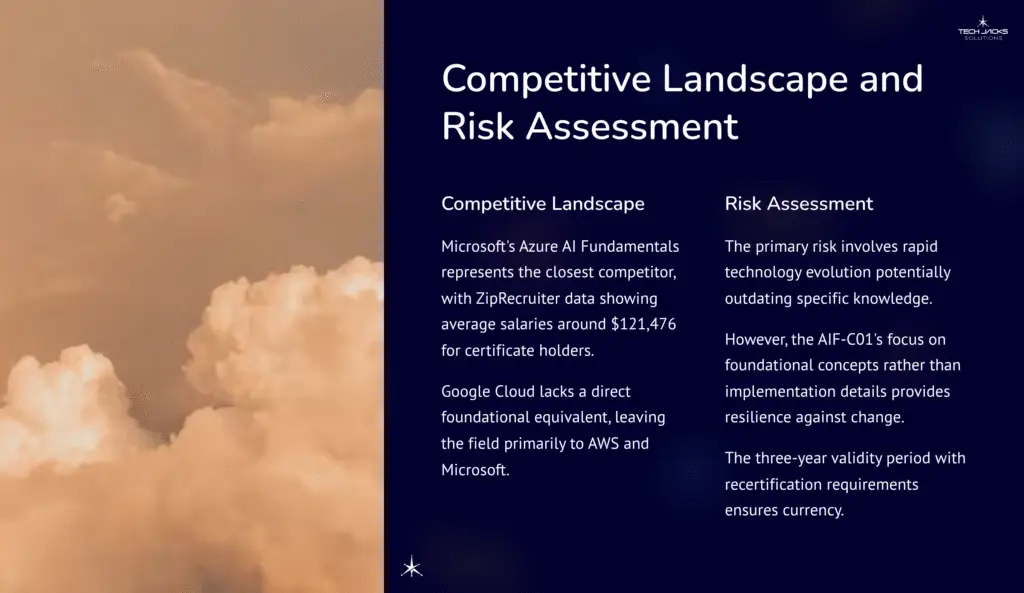
Risk Assessment: The primary risk involves rapid technology evolution potentially outdating specific knowledge. However, the AIF-C01’s focus on foundational concepts rather than implementation details provides resilience against change. The three-year validity period with recertification requirements ensures currency.

Getting Started: Your Next Steps
Ready to pursue the AIF-C01? Follow this strategic pathway.
Step 1: Assess Current Knowledge – Review the official AWS Exam Guide to understand complete scope. Evaluate existing AWS and AI familiarity. Candidates with AWS Certified Cloud Practitioner background gain distinct advantages.
Step 2: Choose Study Approach – Select between official AWS Skill Builder subscription ($29 monthly) or third-party resources. Free official resources include exam guide, practice questions, and basic prep courses. Premium options add full-length practice exams and hands-on labs.
Step 3: Create Study Plan – Follow recommended four-week framework: foundation building, knowledge reinforcement, rigorous practice, and final review. Allocate extra time for domains 2 and 3, which comprise 52% of exam content.
Step 4: Focus on Practice Questions – Community consensus emphasizes extensive practice question work as the key success factor. Target consistent 80-85% scores on practice exams before scheduling real exam.
Step 5: Schedule Exam – Register through AWS Certification site. Choose between Pearson VUE testing centers or online proctoring. Current cost: $100 USD.
Step 6: Plan Next Steps – Use 50% discount voucher for advanced certifications like AWS Certified Machine Learning Engineer – Associate. Consider organizational sponsorship for team-wide AI literacy initiatives.
Step 7: Develop AI Literacy – Beyond certification, explore hands-on experience with Amazon Bedrock, SageMaker, and other AWS AI services. Build practical understanding to maximize career impact.
The AWS Certified AI Practitioner represents more than certification (it’s your entry point into the AI-driven future of work). AI as core competency continues accelerating across industries, making foundational credentials increasingly valuable. Start today.

Reference Resource List
Official AWS Resources
• AWS Certified AI Practitioner Exam Guide
• AWS Certified AI Practitioner Certification Page
• AWS Skill Builder • AWS Training and Certification
• AWS Recertification Policies
Industry Reports and Salary Data
• Skillsoft 2024 IT Skills and Salary Report
• ZipRecruiter AWS Cloud Practitioner Salary Data
• Dice 2024 Tech Salary Report
• Global Knowledge 2024 IT Skills Report
Training Resources
• TutorialsDojo AIF-C01 Study Materials
• Udemy AWS AI Practitioner Courses
• Coursera AWS AI Practitioner Specialization
• O’Reilly AWS AI Practitioner Study Guide
Community and Discussion
• Reddit r/AWSCertifications • AWS Training Blog
Government and Labor Statistics
• U.S. Bureau of Labor Statistics – Computer Occupations

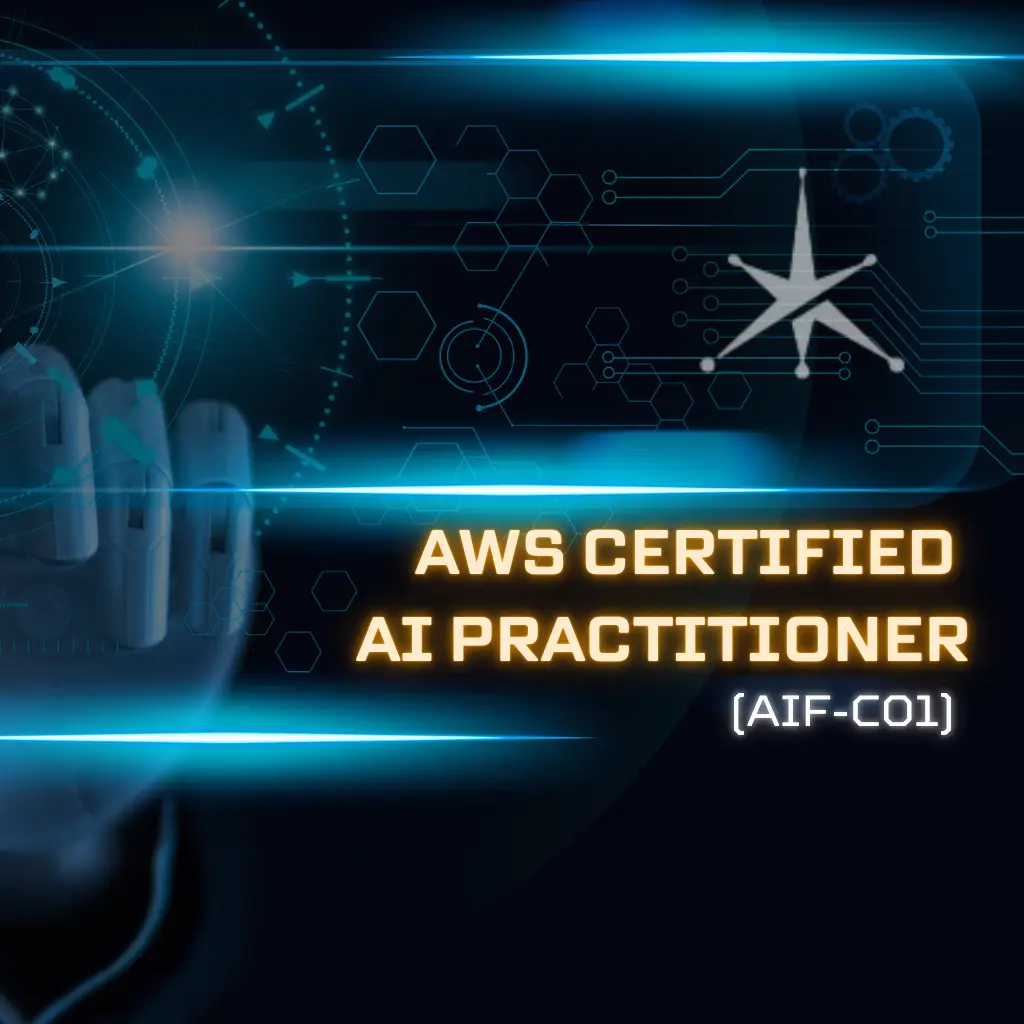
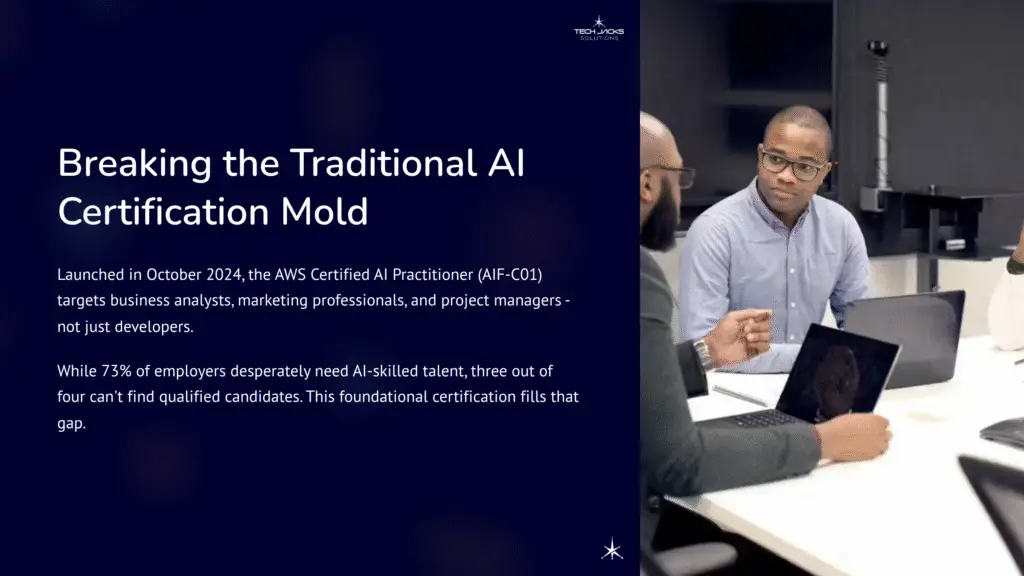
BC
August 18, 2025Your strategic positioning of this certification as bridging business and technical roles is spot-on. The timing analysis around the 73% employer demand vs. supply shortage really highlights the market opportunity.
I remember when getting started with the A+ hardware and software certification (I’m really showing my age here) were entry points, and those exams cost more than a buck. I didn’t think those exams would make me $100k alone either, whereas this likely will.
The $142K salary potential breakdown is particularly interesting – especially the 47% premium data for IT professionals with AI skills. At $100 for the exam, that ROI calculation is hard to argue with. It takes money to make money.